Fighting Fascism: "When Courage Goes Unrewarded" (Part I)
If a war resulting in tens of millions of casualties can be described as such, over the years World War II came to be known as the "Good War" for much of the Western world. It is often said that the victors of a war, any war, write its history. This is almost always true with perhaps one major exception. In the decades since it started eighty years ago in mid-July 1936, the Spanish Civil War - the prelude to WW II in which the three great ideologies of the day, i.e., democracy, fascism, and communism were involved in a bloody clash - is widely regarded by most historians as a worthy and just cause. The accompanying revolution in Catalonia and other areas of Spain was lost by those supporting democratic reform and change. Those seeking a new way of organizing social and economic life, one which rejected hierarchical institutions and deviated significantly from exploitative capitalism, would only experience it for about a year or so. The history of this conflict, however, was not defined and written by the winners.
This is the story of a remarkable group of young American men and women who defied their government and risked everything to fight for their ideological beliefs. It is an important chapter of 20th century history that I think more people should be familiar with. Undoubtedly some of you already know this story; I first posted a shorter version of this two-part essay several years ago. To others new to this blog and who were never part of the great exodus, I hope you enjoy reading it.
In 1936, Bernard Knox fought on the Madrid Front for the French Battalion of the International Brigade. During World War II, he helped to organize the French Resistance and was later Professor of Classics at Yale University.
I first heard the remarkable phrase that serves as my title in 1946 when, fresh out of the US Army, I went up to New Haven, Connecticut for an interview with the chairman of the Yale Classics Department, to which, taking advantage of the generous provisions of what was popularly known as the GI Bill, I had applied for admission to the graduate program for the Ph.D. in Classics...
I was taken aback by the expression. How, I wondered, could anyone be a premature anti-Fascist? Could there be anything such as a premature antidote to a poison? A premature antiseptic? A premature antitoxin? A premature anti-racist? If you were not premature, what sort of anti-Fascist were you supposed to be? A punctual anti-Fascist? A timely one? In fact, in the '30s, as the European situation moved inexorably toward war, the British and French governments (the French often under pressure from the British) passed up one timely opportunity after another to become anti-Fascist.
Bernard Knox, "Premature Anti-Fascist" - Modern American Poetry, University of Illinois, 1998. The 1937 Republican poster shows General Franco as a "terrifying skeleton dressed in a cubist-style uniform inscribed with the Nazi swastika. The small effigies of the military, the capitalist and the armed clergyman that carry Franco's cape create an impression of servile dependence." Poster Source: "The Visual Front" - University of California San Diego Southworth Collection.
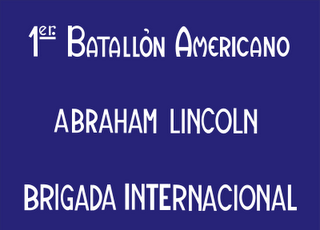
Over a third of the Abraham Lincoln Brigade volunteers were killed in Spain. No one forcibly drafted them. They weren't coerced in any way. No pressures were put on them to risk their lives for another country. Many had never fired a gun let alone receive any formal military training. They were certainly not motivated by profits or other commercial concerns but, rather, simply cared a great deal about their fellow human beings. These brave - and largely-forgotten - men and women traveled to a land most had never seen before nor had any familiarity with. They went to Spain because they believed deeply in their cause.
Those who were lucky enough to survive and return home were labelled "Premature Anti-Fascists" by their government. Doesn't that oxymoronic term imply that the ALB volunteers were prescient in their contempt for Fascism? No matter the period and the circumstances, I don't think it is ever inappropriate to oppose a deadly and discredited Rightist ideology like Fascism.
What in the world was our government thinking?
Flag source: Legends of Our Time.

Introduction
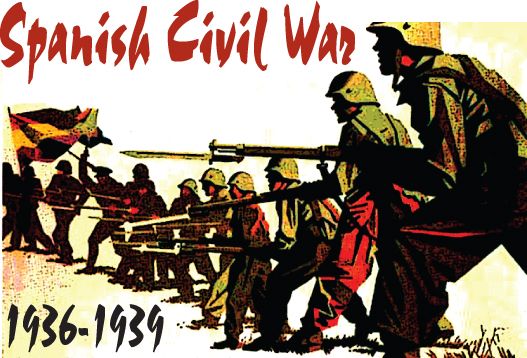
On July 18, 1936, the Spanish Army staged a military uprising against the democratically-elected Republican government of Spain, which had been in power for less than six months. The revolt had started the previous day in the Protectorate of Morocco under the leadership of General Francisco Franco and by the next day, had spread to the mainland. The rebels had badly miscalculated and not anticipated that several army units would side with the government nor expected that the working classes in towns and cities would be quickly mobilized and armed in a popular resistance against the rebellion. In what would become a dress rehearsal for World War II, the struggle that ensued between Republican and Nationalist forces to determine the future direction of the country would rage on for the next three years.
In 1937, Bill Bailey (a son of Irish immigrants to America) wrote a letter from Spain to his mother in New Jersey. Unbeknownst to her and defying a travel embargo imposed by his own government, he had secretly traveled to that country to become one of almost 2,800 American volunteers to eventually fight on the Republican side in a brutal war against the defenders of authoritarian conservatism
You see, Mom, there are things that one must do in this life that are a little more than just living. In Spain there are thousands of mothers like yourself who never had a fair shake in life. They got together and elected a government that really gave meaning to their life. But a bunch of bullies decided to crush this wonderful thing. That's why I went to Spain, Mom, to help these poor people win this battle, then one day it would be easier for you and the mothers of the future. Don't let anyone mislead you by telling you that all this had something to do with Communism. The Hitlers and Mussolinis of this world are killing Spanish people who don't know the difference between Communism and rheumatism. And it's not to set up some Communist government either. The only thing the Communists did here was show the people how to fight and try to win what is rightfully theirs.
You should be proud that you have a son whose heart, soul and energy were directed toward helping the poor people of the world get back what was taken from them. When the horrible conditions of this world are eventually made right, you can look with pride at those who will be here to enjoy it and say, "My son gave his life to help make things better, and for that I am grateful."
If it will make my departure from the world of the living a little easier for you, just remember this, Mom: I love you dearly and warmly, and there was never a moment when I didn't feel that way.
I was always grateful and proud that you were my mom.
Bill Bailey's letter to his mother explaining why he was fighting in the Spanish Civil War. Photograph Source: Spartacus Educational, U.K. Sketch Source: "Spanish Civil War."
In the midst of the Great Depression in the 1930's when economic despair gripped the country and the tenets of a capitalist economic system were being widely questioned - and particularly if you were young, idealistic, leftist, or radical with perhaps a romantic bent - Paris, Madrid, and Barcelona were the places to be for putting your ideological beliefs into practice. For some Americans, the Spanish Civil War and, more importantly, fighting Fascism and opponents of left-wing politics would become the great cause of their lives.
Almost 40,000 volunteers from 52 countries would join hands in helping the Republican Spanish government under siege by rebel forces and their foreign allies.

Vindication (of sorts) for their "radical" beliefs would eventually come but not until a world war would kill tens of millions, and cause unprecedented devastation over six long years from 1939-1945. Fascism was finally defeated in Germany and Italy but would survive in Spain for several more decades. During the Cold War years, many American veterans of the Spanish Civil War were treated with suspicion and blacklisted in their own country. The McCarthy Era spared no one with even the most tangential connection to "subversive" causes. Such was the level of anti-Communist hysteria in this country.
Part I of this wide-ranging essay looks at a few of the American volunteers who fought in military battalions that collectively came to be known as the Abraham Lincoln Brigade (ALB); the tense political, economic, and social conditions that existed in pre-war Spain; a revolution taking place and one which reorganizes social and economic life; the response by the American government and its insistence upon assuming a neutral position in this conflict; snippets about the ALB volunteers caught between economic depression at home and alarming developments on the international level; what eventually motivated them to secretly travel to and fight against Fascism; and their battlefield exploits in Spain.
Part II continues the story of the ALB volunteers and evaluates the factors that contributed to the Republican side's defeat; the betrayal by many of the revolution that started in Catalonia and spread to other areas; the poetry, art, music, and images that resulted from this war; the return home and mistreatment by their own government; and, finally, how the ALB volunteers are perceived in historical terms.
Pictured above are several members of the International Brigade in Spain. Source: ALBA - The Abraham Lincoln Brigade Archives. To read more about McCarthyism, see this earlier diary of mine about the Boomers, The Baby Boom Generation, Part I of III - The Wonder Years and another one on the remarkable life of Paul Robeson, "The Most Persecuted, the Most Ostracized, the Most Condemned Black Man in America, Then or Ever."

Spain in the 1930s
By 1936, Spain was still a country driven by 19th century traditions. Its societal structure was largely dominated by industrialists, wealthy landowners (the Catholic Church among the largest), and the military. Anticlerical feelings were rampant among the working classes and it was said that 'Spaniards followed their priests either with a candle or a club'. With its empire shrunk by defeat at the hands of the United States in the 1898 Spanish-American War, entrenched institutions were resistant to change; obsessed with upholding traditional values; hostile towards and stifling regional aspirations; maintaining law and order; and jealously guarding economic privileges that this status bestowed upon them.
The military dictatorship of General Miguel Primo de Rivera in the 1920's and the subsequent abdication of King Alfonso XIII in 1931 set into motion a series of political events over the next five years. The establishment of the Second Republic in 1931 and its goal of promoting secularism set the stage for General Franco's revolt of July 18, 1936
|
As we have witnessed in our own politics in recent years, opposition to a governing political party frequently unites disparate factions in pursuit of a common goal and, at times, papers over deep divisions. Once in power, the winning coalition often begins to fray over time. In the case in Spain, the government in power had barely had time to get its feet wet. The loose coalition that made up the Popular Front Government was now facing a united opposition which refused to accept the government's legitimacy. The Nationalists would now resort to military means to overturn the results of the February 1936 Elections.
When the first shots of the civil war were fired, the country was bitterly divided into two camps
On one side was the Republican government supported by liberals, socialists, Communists, anarchists, peasants, the working class, and advocates of regional autonomy. They ranged from those supportive of a moderately capitalist liberal democracy to those advocating a revolutionary state.
On the other side was the military led by General Francisco Franco, nationalists, conservatives, fascists, Roman Catholic clergy, large land owners, and monarchists. They generally favored a strong central state and a dominant role for the Roman Catholic Church in Spanish society and opposed democracy. The Republican side was divided while General Franco was able to unite the various right-wing forces.
Soon after the revolt started in July 1936, the country was split into two parts with the Republicans controlling the red areas and Franco's Nationalist the ones in grey. Map Source: Boston College.

The Anarchist Revolution and Opposing Franco
For most of the world - and I suspect for the vast majority of the volunteers of the international brigade - it was obvious who the enemy in Spain was: Fascism. That, however, is far from the complete story. Concurrent with the task of preventing Franco's nationalists to overthrow the democratically-elected Republican government was a people's revolution that sprung in many parts of Spain largely due to the efforts of Anarchist groups like the CNET and FAI, aided by their Socialist allies. When the civil war started, the Communist-dominated Republican government did not have a clue as to how to respond to Franco's assault.
When Franco's Nationalists revolted on July 18, 1936 and Madrid was under siege by the rebels, Dolores Ibarruri Gomez, a member of the Partido Comunista de Espana (or the Communist Party of Spain), gave a speech using these two words, "!No Pasaran!" The words were first used by French General Robert Nivelle during the Battle of Verdun (French: "Ils ne passeront pas/On ne passe pas") between the German and French armies in World War I. That bloody battle in Northeastern France resulted in 306,000 deaths. "!No Pasaran!" would become a political slogan and symbol of Republican defiance and determination. Banners were seen all over city streets expressing this strong desire to confront the rebels.
Anarchism had a long history in Spain. The Anarchist and Socialists took the initiative in organizing the successful resistance in July 1936.
Anarchism is the political belief that society should have no government, laws, police, or other authority, but should be a free association of all its members... The Anarchist movement in Spain emerged in the 1860s. At first it main impact was on peasant communities. At the time there were 550,000 landless labourers whereas 0.1 per cent of the population owned 33 per cent of all arable land. Pierre-Joseph Proudhon, the French anarchist with strong views on the ownership of land, was one of those whose teachings influenced the views of Spanish peasants.
By the beginning of the 20th century the anarchist movement in Spain was the strongest in Europe. The main support came from the industrial workers of Barcelona and in 1911 activists formed the anarcho-syndicalist trade union, the National Confederation of Trabajo (CNT)... In 1921 Miguel Primo de Rivera banned the CNT. It now became an underground organization and in 1927 an inner-core of activist established the Federación Anarquista Ibérica (FAI). The FAI was strong in Catalonia and Aragón and members made several unsuccessful attempts to assassinate Alfonso XIII...
On the outbreak of the Spanish Civil War anarchists set up the Antifascist Militias Committee in Barcelona. The committee immediately sent Buenaventura Durruti and 3,000 anarchists to Aragón in an attempt to take the Nationalist held Saragossa. In the first few weeks of the Spanish Civil War an estimated 100,000 men joined Anarcho-Syndicalists militias. Anarchists also established the Iron Column, many of whose 3,000 members were former prisoners.
Poster source: "The Spanish Civil War Poster" - ALB Archives. Some of these posters were created anonymously; others by members of the Spanish Artist’s Union. It depicts the crucial role played by the CNT and FAI in the defense of Madrid following Franco's revolt. Ibarruri - famously known as "La Pasionaria" or, passion flower - lived abroad in exile for 38 years and returned to Madrid in 1977, winning a parliamentary seat later that year in the Spanish Parliament at the age of 81. She was also the honorary president of the Communist Party of Spain until her death at age 93 in 1989.
Over the next few days and weeks, Franco's attempt to take over Madrid had failed.
The coup was only smashed by the activity of the working class. The fascists made some headway in parts of the country but in Catalonia, and especially Barcelona, the CNT (Anarcho-Syndicalist union) showed how to fight. They declared a general strike and took to the streets looking for arms which the government refused to give them. In the end they stormed the barracks, and took what they needed.
The workers immediately set up barricades and within hours the rising had been defeated. Arms were seized and given to workers who were dispatched to other areas to prevent risings. Madrid was also saved because of the heroism and initiative of the workers. Hearing of what had happened in Barcelona they had stormed the main army base in the city.
The action of the rank and file saved the Spanish Republic. Not just the CNT but the UGT (Socialist union) and POUM (Anti-Stalinist Communists) joined in the fighting. For these workers this was not just a war to defeat the fascists but the beginning of revolution. Workers' militias were established. Workplaces were taken over and peasants seized the land...
It was in the countryside that the Spanish revolution was most far reaching. The anarchist philosophy had been absorbed by large layers of the downtrodden peasants and the outbreak of revolution was the opportunity to put these ideas into practice.
"1936-1939: The Spanish Civil War and Revolution" - Libcom.
At the core of this revolution in Catalonia was the collectivization of land on a large-scale basis, dramatic increase in industrial production, radical transformation of the economy, elevated roles for women, and unleashing of an unprecedented egalitarian spirit noted by George Orwell in Homage to Catalonia.
The Anarchists were still in virtual control of Catalonia and the revolution was still in full swing. To anyone who had been there since the beginning it probably seemed even in December or January that the revolutionary period was ending; but when one came straight from England the aspect of Barcelona was something startling and overwhelming.
It was the first time that I had ever been in a town where the working class was in the saddle. Practically every building of any size had been seized by the workers and was draped with red flags or with the red and black flag of the Anarchists; every wall was scrawled with the hammer and sickle and with the initials of the revolutionary parties; almost every church had been gutted and its images burnt. Churches here and there were being systematically demolished by gangs of workmen. Every shop and cafe had an inscription saying that it had been collectivized; even the bootblacks had been collectivized and their boxes painted red and black. Waiters and shop-walkers looked you in the face and treated you as an equal. Servile and even ceremonial forms of speech had temporarily disappeared. Nobody said ‘Senior’ or ‘Don’ or even ‘Usted’; everyone called everyone else ‘Comrade’ and ‘Thou’, and said ‘Salud!’ instead of ‘Buenos dias’. Tipping was forbidden by law; almost my first experience was receiving a lecture from a hotel manager for trying to tip a lift-boy. There were no private motor-cars, they had all been commandeered, and all the trams and taxis and much of the other transport were painted red and black. The revolutionary posters were everywhere, flaming from the walls in clean reds and blues that made the few remaining advertisements look like daubs of mud. Down the Ramblas, the wide central artery of the town where crowds of people streamed constantly to and fro, the loudspeakers were bellowing revolutionary songs all day and far into the night. And it was the aspect of the crowds that was the queerest thing of all. In outward appearance it was a town in which the wealthy classes had practically ceased to exist. Except for a small number of women and foreigners there were no ‘well-dressed’ people at all. Practically everyone wore rough working-class clothes, or blue overalls, or some variant of the militia uniform.
All this was queer and moving. There was much in it that I did not understand, in some ways I did not even like it, but I recognized it immediately as a state of affairs worth fighting for. Also I believed that things were as they appeared, that this was really a workers’ State and that the entire bourgeoisie had either fled, been killed, or voluntarily come over to the workers’ side; I did not realize that great numbers of well-to-do bourgeois were simply lying low and disguising themselves as proletarians for the time being.
George Orwell, Homage to Catalonia, pp 2-3.
The below video is a 1997 Spanish language documentary with English subtitles, "Living Utopia." It shows interviews with anarcho-syndicalists and anarchist militants from the CNT-FAI recounting their achievements in the people's revolution.
[video:https://www.youtube.com/watch?v=jPl_Y3Qdb7Y width:510] They coordinated their efforts through free association in whole regions, created new wealth, increased production (especially in agriculture), built more schools, and bettered public services. They instituted not bourgeois formal democracy but genuine grass roots functional libertarian democracy, where each individual participated directly in the revolutionary reorganization of social life. They replaced the war between men, 'survival of the fittest,' by the universal practice of mutual aid, and replaced rivalry by the principle of solidarity....
This experience, in which about eight million people directly or indirectly participated, opened a new way of life to those who sought an alternative to anti-social capitalism on the one hand, and totalitarian state bogus socialism on the other.
The above description comes from the The Anarchist Collectives as mentioned in Vivir la utopía.

Stuck in Neutral in the United States
After the great stock market crash of 1929, the supply of unemployed workers greatly exceeded the number of available jobs in the country. To secure better work conditions and ensure some measure of job security for themselves, the employed workers rallied to form and join labor unions. In 1930, Bill Bailey became a sailor, joined the Industrial Workers of the World (IWW) and, later, the Communist Party of the USA (CPUSA).
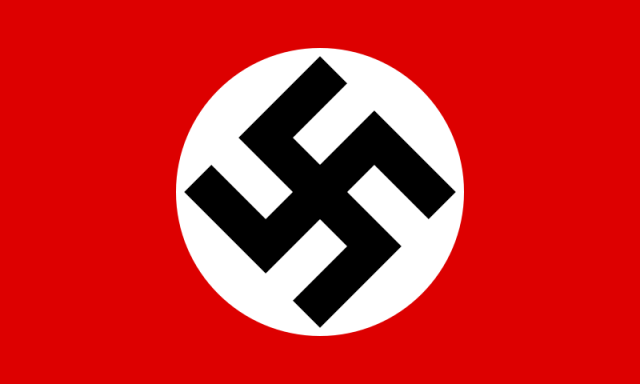
In 1935, Bailey had traveled to Italy and seen firsthand for himself the corrosive effect Benito Mussolini's ultra-nationalist, Fascist dictatorship was having upon Italian society. It alarmed him. Later that year, Bailey had acquired quite a reputation as an anti-Fascist when he pulled the Swastika flag from the visiting German ocean liner SS Bremen and tossed it in the Hudson River in New York City. Bailey was arrested and beaten but only released later with the help of Congressman Vito Marcantonio. (read interesting details of this incident as described by Bailey in The Kid from Hoboken, Chapter XIV: Ripping the Swastika off the Bremen - 1993. The entire book is available online.)
The Bremen had been a symbol of pride for a resurgent Germany. In response to this perceived insult and humiliation, German Fuhrer Adolf Hitler would adopt the Swastika as the exclusive flag of Nazi Germany. As Bailey described it, "The old flag of the Weimar Republic was a thing of the past." Hitler was making a clean break from the past in his quest to have the Third Reich last for a thousand years.
Bailey was far from the only American concerned about the rise of Fascism in Europe but was helpless as his own government had different ideas about how to combat this rising menace. Pragmatic approaches are often wrong
|
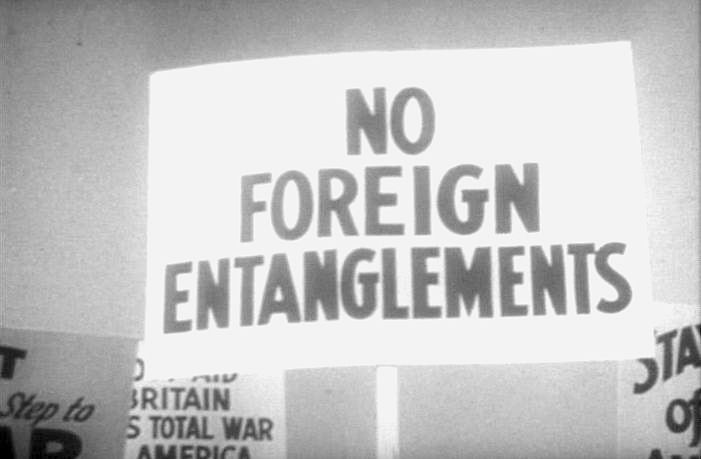
Separated by two oceans from much of the rest of the world, it is perhaps easy to understand the natural impulse towards isolationism in the United States.
President Woodrow Wilson's failure in having the United States Senate ratify the post-World War I Treaty of Versailles meant that lack of American participation in the League of Nations (the predecessor to the United Nation) would also promote a countrywide feeling of disinterest in international affairs. In the years prior to the outbreak of hostilities in Spain, isolationism was the fashion of the day in foreign policy and very prevalent in much of the country. In 1919, the treaty's fate had been sealed by stubborn Republican opposition (of course, with the help of some Democratic U.S. Senators) in a closely divided, Republican-controlled United States Senate (49-47 seats). Wilson's refusal to compromise with his political opponents did not help matters much, either.
In 1936, President Franklin Roosevelt was faced with difficult choices. While sympathetic to the Republican cause, he was preoccupied with implementing the New Deal to get the country out of economic depression. He also did not want to alienate an important Democratic constituency group: Irish-Americans, many of whom disliked the anti-clerical feelings amongst various Republican groups towards the Catholic Church in Spain. The Neutrality Laws further limited FDR's options.
To some degree, most politicians (even the great ones) tend to be cautious and play it safe when it comes policy decision making. FDR chose not to rock the boat and go against the current of mainstream public opinion. It would take almost a decade of war from 1936-1945 before isolationism would become passe in the United States.
|

The Abraham Lincoln Brigade Volunteers: Spain On Their Minds
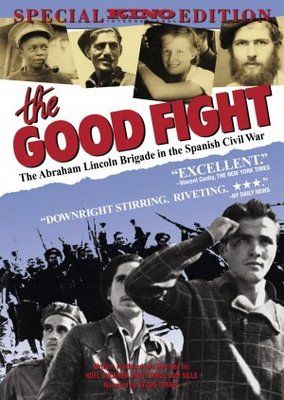
By the early 1980's, many of the surviving volunteers of the Abraham Lincoln Brigade were entering their seventies. With financial assistance from the National Endowment for the Humanities, a group of independent film makers decided to make and release a documentary film in 1984 about the lives of a few of these volunteers. The Good Fight: The Abraham Lincoln Brigade in the Spanish Civil War (complete film available on Vimeo) focuses not as much on the complexities of war itself but, rather, looks at it from a human perspective. Narrated by Studs Terkel, it details the prevailing conditions in this country in the mid-1930's; takes us through their journey to Spain and into battle; has excellent footage of the war; examines their lives in the post-war years; and is interspersed with interviews about their personal initiatives to take concrete action and strongly oppose Fascism.
When the war started in the summer of 1936, American participation was strongly opposed by a small but growing group of American Fascists, foremost among them the pro-Nazi German American Bund and the Silver Shirts. The Ku Klux Klan and through the Christian Front, Father Charles Coughlin also railed against the dangers of creeping Communism. A coalition of communists, socialists, and liberals tried to rally American public support against Fascism.
It was an uphill task.
(I wrote about Father Charles Coughlin in 2009 soon after Dr. George Tiller was murdered in this diary - The Week in Editorial Cartoons - Demagogues Amongst Us. He was once described as a "combination of Huey Long and Joe McCarthy in clerical cassock, with a touch of Goebbels thrown in.")
By November 1936, Madrid was in danger of falling to General Franco's forces. Disappointed by its own government's inaction and alarmed by pro-Fascist efforts by these rightist groups, a number of young Americans decided to do something about it. This group included, in addition to Bill Bailey, Ed Balchowsky, Bill McCarthy, Salaria Kea, Steve Nelson, Abe Osheroff, Ruth Davidow, Tom Page, Dave Thompson, Milt Wolff, and Evelyn Hutchins. (watch their reactions to the growing threat of Fascism in "The Good Fight", Episode I of XII)
Not unlike many young leftists of that period, they viewed this struggle in ideological terms
"More clearly than any American combat in the past, wrote an American volunteer in 1937, "the war in Spain is a fight to the finish between all that is new and generous and hopeful in the world and all that is old, cruel, and fetid. It is the thing that moralists had almost given up hoping for - a clear-cut struggle between the powers of light and the powers of darkness, and very little twilight zone to confuse us. How," he wanted to know, "can one stay out of this struggle?" The decision of the political Left in Spain - and the Comintern elsewhere - to confront the Franco insurrection with military force defined the conflict as an ideological struggle between world socialism and fascism. "It was a highly political war," explained the rank and filer Morris Mickenberg. "The first and primary meaning of everything was the political meaning. That is how we lived, that is how we thought, that is how we talked to each other. Indeed, the men engaged in endless political dialogue and debate, avidly following world events, and viewed their commitments in ideological terms." (Carroll, p. 107)
Almost all of the episodes of "The Good Fight" are available in full on YouTube and you can also see the entire film on Vimeo. YouTube, the film is divided into 12 episodes with the total length being about 100 minutes. Pictured on the very top of the DVD cover are (from left to right) Tom Page, Milt Wolff, Evelyn Hutchins, and Ed Balchowsky. The above photograph shows a demonstration in New York City urging the government to support the Republican cause. DVD Cover Source: Amazon.com. Photograph Source: "A Photo Essay on the Great Depression" - Modern American Poetry, University of Illinois.
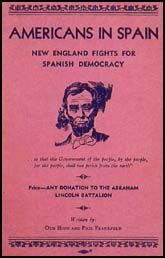
The volunteers of the Abraham Lincoln Brigade came from every corner of the country, every walk of life, and virtually every state in the union except Delaware and Wyoming. Here are some interesting demographic facts about this diverse group of men and women:
- 70% were between 21 and 28 years old. The youngest was 18 and the oldest 60 years old. The group's median age was 27 and the median birth date 1910. Most were unmarried and around 30% were Jewish. Approximately 20% were New Yorkers including Bill Bailey, Milt Wolff, Abe Osheroff, Ruth Davidow, Tom Page, and Bill McCarthy.
- About 90 were African-Americans, including Oliver Law. A labor organizer from Chicago, he went on to command the very first fully integrated American military fighting unit in history. Race relations were mostly excellent in the group. (Law commanded this integrated force over a decade before President Harry Truman signed an Executive Order to desegregate the United States military in 1948. See this 2009 diary of mine for details - The Week in Editorial Cartoons - Confronting Racism)
- Most came from working class backgrounds and a variety of professions. Over 1,000 were industrial workers coming from the mining, steel, and seafaring industries. About 500 were either students or teachers. At the time, Ed Balchowsky was a student in Chicago and Steve Nelson a labor organizer in Pennsylvania.

- Most (60%) were members of the communist party. Others were either IWW members (Wobblies) or socialists. Some were unaffiliated.
-
60 volunteers were female. Ruth Davidow and Salaria Kea (originally from Georgia, she was living in NYC in 1936) worked as nurses. Evelyn Hutchins (pictured above, from Washington State) worked in transportation and drove a truck in Spain. Women had to fight for their rights but eventually came to be respected by their male peers.
The demographic facts come from a variety of sources. See here, here, here, and here. Poster Source: Spartacus Educational, U.K. Photograph Source: ALBA. It shows Evelyn Hutchins, a volunteer ambulance and truck driver in Spain
The good interpersonal relations between the volunteers of the Abraham Lincoln Brigade - and two groups in particular - were rooted in the emergence of a common threat and a desire to change their fortunes in American society. It was a harbinger of what would occur two decades later when the same groups would join hands in overcoming Jim Cow laws and confront an internal enemy in the American South: racial segregation
The motivations and experiences of the volunteers were multifarious. Political, social, economic and psychological factors all played their part and it would be wrong to generalize about a monolithic Jewish or African-American response to the war. Some volunteers considered themselves communists; others anti-fascists or liberals...
The Jewish and African-American Lincolns offer fascinating subjects for comparison. The two groups had a deep affinity based on a common victim status and rich cultural exchange. Jewish radicals were at the vanguard of the black civil rights movement. Hitler’s persecution of Jews and Mussolini’s attack on Ethiopia in 1935 were understood as part of the same racial threat. Black entertainer Paul Robeson recorded Yiddish songs for the Jewish Lincolns whilst Edwin Rolfe sang Negro spirituals in the company of Langston Hughes. Such moments typified Jewish-black relations on the radical Left in the mid-30s.
[M]any Jews saw the Left as a means of shedding their ethnicity, black radicals were attracted by its potential for racial uplift. Both groups hoped Spain would allow them to overcome their social marginalization and achieve integration within the American polity and the international proletariat. (Sackman, p. 8)
Sarah Sackman, "The Identity Politics of Jews and African Americans During the Spanish Civil War" - ALBA Archives. Photograph Source: Black in the Day: Black American Volunteers in the Spanish Civil War. The above photograph show Salaria Kea working in a Republican hospital in Spain. To read more about Salaria Kea, see "Salaria Kea: A Negro Nurse in Republican Spain" - ALBA.
What finally motivated them to make the journey by late 1936 to Spain? At the time, Tom Page was a poor, unemployed, African-American living in New York City. Milt Wolff worked for the Civilian Conservation Corps. Ruth Davidow had graduated earlier that year from Brooklyn Jewish Hospital with a degree in nursing and had never been active in politics. Dave Thompson was unique in this group in that he was a magazine writer from a fairly affluent family in California.
Here's how they reacted to events in Spain
Tom Page: Any demonstration against Fascism, I would be there... I didn't have a nickel but I'd go. Go down to 14th Street. This is what I would do. And the beautiful thing about it was the feeling of camaraderie there. Everyone had a oneness, a singleness of purpose irrespective of their color or their sex. And this is a wonderful feeling.
Milt Wolff: I told them (in public forms) that the Spanish people have risen up and are resisting this. This is the first resistance to the march of Nazi aggression that has manifested itself. It has not happened in China. It has not happened in Africa. In both places, they were suppressed and defeated. But the Spanish people are fighting back and they are winning. And with your help, with our help, we can defeat Fascism in Spain. We can make Madrid the tomb of Fascism. And we can save our lives, our children's lives, and turn back this menace.
Ruth Davidow: First there was Hitler and the whole question of abuse of the Jews. Bad as I felt about it, I thought it was a German problem and not an American problem. And then the Italians went into Ethiopia and I still thought it was pretty much an Italian problem or an Ethiopian problem. I could not really connect it. What really shook me when both Hitler and Mussolini went into Spain and I realized they were not going gonna be satisfied with a piece here, a piece there. They were out for the whole world. And I began to feel pretty much involved in what was happening. I was pretty upset, as a matter of fact.
Dave Thompson: I became aware of what was going on over there and was very much on the side of the Republic because it seemed to me they were for all the things America stood for: a little less power to one church, a little less land for the nobility, more for the people, universal education. All the things America stood for. Well, the first thing you know is that England, France, and the United States aren't going to stand for anything like that. The next thing you know is that Congress has voted for non-intervention following the lead of Neville Chamberlain and not to get involved on either side. This was cutting off the Republic's chance to defend itself.
Tom Page's comments are from The Good Fight, Part II of XII beginning at the 0:40 mark. Comments by Milt Wolff, Ruth Davidow, and Dave Thompson are from The Good Fight, Part III of XII starting at the 4:20 mark. The above photograph shows 16 volunteers of the Abraham Lincoln Brigade Ambulance Corps in New York City. Photograph Source: A Photo Essay on the Great Depression, University of Illinois.

Reaching Spain and Fighting the Fascists
Having made the commitment in late 1936 to go fight in Spain, the volunteers began to organize. Often disguised as tourists, they left on ships for France and then took trains that put them near the Pyrenees Mountains. Making the treacherous trek through the mountains and evading border guards, they reached Catalonia in northern Spain.
As Bill Bailey describes it in his book, the difficult fighting lay ahead but their spirits were soaring, even after making an 8,000 miles long trip from all the way from San Francisco as he did
|

From early 1937 onwards, the ALB volunteers fought in every major battle of the Spanish Civil War. Among other encounters, these included the battles of Jarama, Brunete, Belchite, Aragon, and the decisive last stand at Ebro before the fall of Madrid in late March 1939. This summary will give you a very good idea of the major campaigns they participated in, the losses they inflicted upon Franco's Nationalists, and the casualties they suffered themselves.
The above map (click this link for larger map version) gives a good visual overview of these battles. You can read an excellent week-by-week summary of the ALB's military activities and major developments in the war -- Chronology of the Spanish Civil War - Emphasizing the Lincoln Battalion Involvement. Although most of the volunteers of the international brigades left Spain by late 1938, a few stayed on until the bitter end. This withdrawal had been initiated by the Republican government to force Germany and Italy to also withdraw their troops. Both countries refused to do so. The Spanish Civil War would officially end on April 1, 1939. This graphic YouTube video summarizes the entire war in a few minutes.
In January 1938, Paul Robeson and his wife Eslanda Cardozo Goode traveled to Spain where Paul met with and also the performed several times for the troops. Eslanda made this entry in her diary
Saw lots of Negro comrades, Andrew Mitchell of Oklahoma, Oliver Ross of Baltimore, Frank Warfield of St Louis. All were thrilled to see us and talked at length with Paul. All the white Americans, Canadians and English troops were also thrilled to see Paul... Major Johnson told the men that they are to go up to the front line tomorrow. The men applauded uproariously at that news.
Then Paul sang, the men shouting for the songs they wanted: 'Water Boy', 'Old Man River', 'Lonesome Road', 'Fatherland'. They stomped and applauded each song and continued to shout requests. It was altogether a huge success. Paul loved doing it. Afterwards we had twenty minutes with the men and took messages for their families...
As we drove along, Lt. K. got talking and told us the story of Oliver Law. It seems he was a Negro - about 33 - who was a former army man from Chicago. He had risen to be a corporal in the US Army. Quiet, dark brown, dignified, strongly built. All the men liked him. He began here as a corporal, soon rose to sergeant, lieutenant, captain and finally was commander of the Battalion - the Lincoln-Washington Battalion. K. said warmly that many officers and men here in Spain considered him the best battalion commander in Spain. The men all liked him, trusted him, respected him and served him with confidence and willingly.
Read her full diary entry in which she recounts the details of Oliver Law's death from a sniper's bullet.
"Eslanda Goode" - Spartacus Educational, U.K. Photograph Source: "Oliver Law" - Spartacus Educational, U.K. In the photograph, Paul Robeson is in the middle with hat on and Oliver Law on the right.

The ALB Volunteers Reflect on Their Experiences
In the final episode of the The Good Fight (go to the 1:25 mark of this video), you will see a number of the ALB volunteers reflecting back on their experiences in Spain. There are no feelings of regret nor any second-guessing about their decision to go to Spain. In fact, there is nothing but real pride and satisfaction in their voices that they were true to themselves and their individual consciences.
If you believe passionately in a cause, if you did what you thought was right, then, your conscience has be clear and unburdened with any guilty feelings or sense of remorse. Having the courage of your convictions is hardly a human character flaw.
Believing in something is what really matters in life.
|

There is a lot more to the story of the Abraham Lincoln Brigade volunteers and it continues in Part II of this diary.

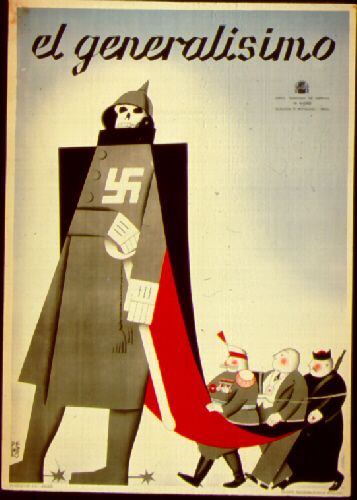

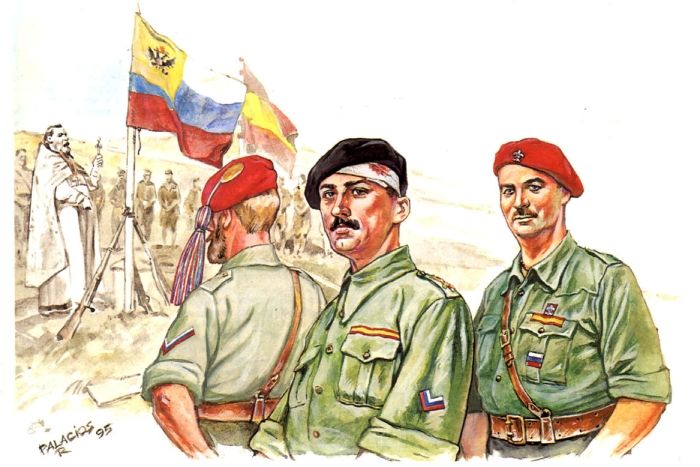

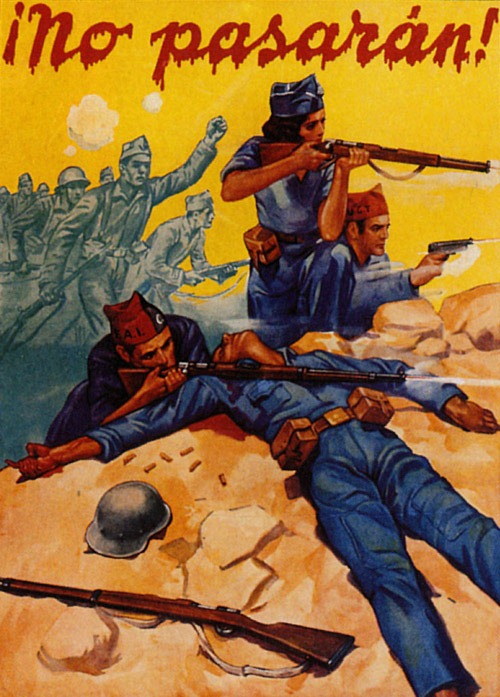

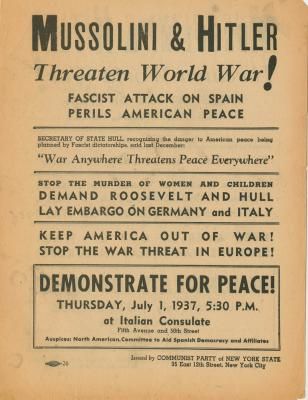
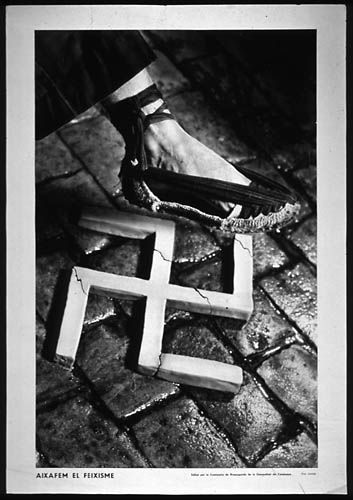





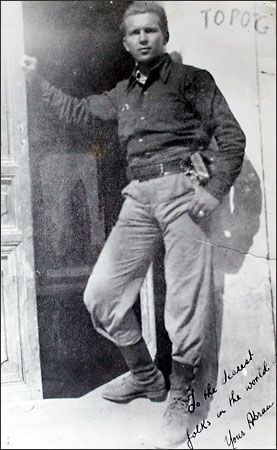
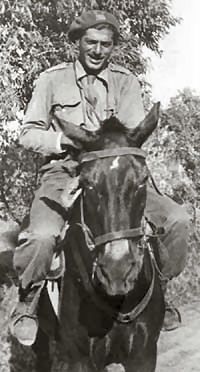

Comments
In Reading This Essay
... you will undoubtedly recognize political themes and arguments still relevant to and resonating even today in our politics. Politicians come and go but some issues and concerns never seem to change.
Today, I wonder how many of us would be willing to make similar commitments like the Abraham Lincoln Brigade volunteers did in the 1930s. A few amongst you might disagree with their radical political beliefs and, perhaps, even the methods they used to pressure their government. Even so, one can't but think of them as a highly principled group of Americans who made great sacrifices.
May all of us have the courage to act upon our political beliefs. Thanks.
ps: I'll post Part II of this diary within the next 30 minutes or so.
A riddle wrapped in a mystery inside an enigma
If You Can, Please Make a Donation to ALBA
I should mention that I do not have any connection to ALBA but I'm providing this information in case some of you would like to support it. The ALBA facilities are located in New York University's Tamiment Library. It is a fantastic resource for an important chapter of American progressive history. For those of you who are teachers, here are more details about the use of these archives.
A riddle wrapped in a mystery inside an enigma
OMG, deep kudos for both parts of this essay. JtC please pin
this somewhere permanent. Can't read it all at once. But it's excellent and I don't want to lose it in the digital mud.
Thanks Mr. Hide, I would love to know who you are... Sigh..
https://www.euronews.com/live
So glad you're writing here, JnH.
Amazing work, as always.
Many Thanks
I like this blog very much. Lots of differing voices, (almost) no limits on dissent, and best of all, no compulsion to engage in conformist thinking.
The Overlords of caucus99percent deserve a great deal of credit.
A riddle wrapped in a mystery inside an enigma
What a fantastic essay. Half through and
watched the documentary "Living Utopia". learn so much. To be continued tomorrow ...thank you for this, JekylinHyde. Sometimes one find pearls online.
https://www.euronews.com/live
Another TV Series on the Spanish Civil War
... was done by UK's Granada TV in the 1980s. Here is the complete documentary on YouTube.
This is Part II of this documentary and deals with the Revolution in Catalonia. Thanks, mimi.
[video:https://www.youtube.com/watch?v=8YhBDJvbl4k width:550]
A riddle wrapped in a mystery inside an enigma
What an excellent essay.
Is that song with the lyrics "won't you come home Bill Bailey" about this Bill Bailey?
There is nothing which I dread so much as a division of the republic into two great parties.. This...is to be dreaded as the greatest political evil under our Constitution.--John Adams
The "Bill Bailey" Song You Referred to Was Written in 1902
... and was recorded by many different artists.
A riddle wrapped in a mystery inside an enigma
As with the French Revolution, I don't know nearly enough about
the Spanish Civil War, having been a student in the American (miss)education system where anything that threatens our hegemony over everyone else (or especially if it gives the peasants any ideas) is dutifully buried and never taught or even mentioned. I've always loved history, but if one really wants to delve in in this country one has to do it on his or her own, with the occasional college professor having the requisite fortitude to buck the corporatist and Amercian Exceptionalism mold.
Deep gratitude for this stellar essay JnH. It really made my day. With all the despairing and confounding news developments lately I've found myself less inclined to read and keep up with "the news." Instead I've been reaching for the bookshelf, to connect with people who have been at the struggle in other ways and times. And although I'm a huge Orwell fan I have been putting off "Homage to Catalonia" for some reason. Probably because when I set into a subject I usually dive in deep, to the exclusion of most else for a time. Speaking of books related to your essay, just picked up a big volume on Paul Robeson's speeches when we were down at a radical bookstore in Philly a couple of weekends ago there to protest the DNC (along with a bio on Nikola Tesla, David Cay Johnston's "Free Lunch"). "Wages of Rebellion," Hedges' latest, is also a must-read now for everyone; as the subtitle suggests, "The Moral Imperative of Revolt." Apologies for the digression. To me it's all relative to the core of what your essay is about.
Looking at the abyss of electoral politics this year more than ever perhaps has forced an existential crisis. I'm sickened that even some of my progressive-leaning friends are wolfing down at the all-you-can-eat Fear buffet being thrown by the DNC and MSM. How do you like your Fascism, medium-rare or well done? The more benign-looking but just as evil Inverted Totalitarianism of Neoliberalism, or the comic parody of a moronic, vulture capitalist, ADD-afflicted, stunted-adolescent, racist, bigot buffoon?
If only we as a society read, studied and shared history like this we'd know that we have a long line of antecedents who also believed and lived in Occupy-style arrangements of mutual aid, solidarity and cooperative businesses. It can be done and has been attempted. Like the adage, if you don't know your history you're doomed to repeat it. Thanks for the tip about NYU's Tamiment Library, sounds like a place worth visiting. I look forward to spending some time with this comprehensive piece and returning back to it over time to get its full import. Thanks again for the incredible effort you put into this.
Have you heard this? Great band from England late 80's/90's. This was the single from their excellent album "This Is My Truth Tell Me Yours," released in the late 90's. Someone put together a video with iconic imagery of the fascist fighters and the lyrics.
"If I should ever die, God forbid, let this be my epitaph:
THE ONLY PROOF HE NEEDED
FOR THE EXISTENCE OF GOD
WAS MUSIC"
- Kurt Vonnegut
There Are a Number of Good Books About P. Robeson and G. Orwell
Suffice it to say, I am a huge fan of both Paul Robeson, the 20th century's greatest Renaissance man, and George Orwell, perhaps the best political writer ever.
George Orwell was not only a fabulous political analyst, but a very great essayist. Other than Homage to Catalonia (perhaps his best book), here are a few suggested readings. All of them are available online in full.
I greatly appreciate your comments about my essay. Thank you.
A riddle wrapped in a mystery inside an enigma
JnH - great essay, great writing
And the voices of those folks involved in this strange war are very uplifting.
glitterscale
"Land and Freedom" - Movie Based on Orwell's Homage to Catalonia
I forgot to add this in one of my earlier comments. Here's another BBC video about the making of this movie.
[video:https://www.youtube.com/watch?v=vIsZJbg8N0s&list=PLD24928A2F54A1D9F&index=1 width:600]
I think you're correct about the voices of the ALB volunteers being uplifting. I've watched "The Good Fight" several times and watched it again last night. There is a clarity and sense of purpose of doing something much larger than themselves.. There is no hesitation, no equivocation, no doubts about what they wanted to do - difficult as it was in trying to slip into Spain through France.
Thanks for your comments, glitterscale.
A riddle wrapped in a mystery inside an enigma